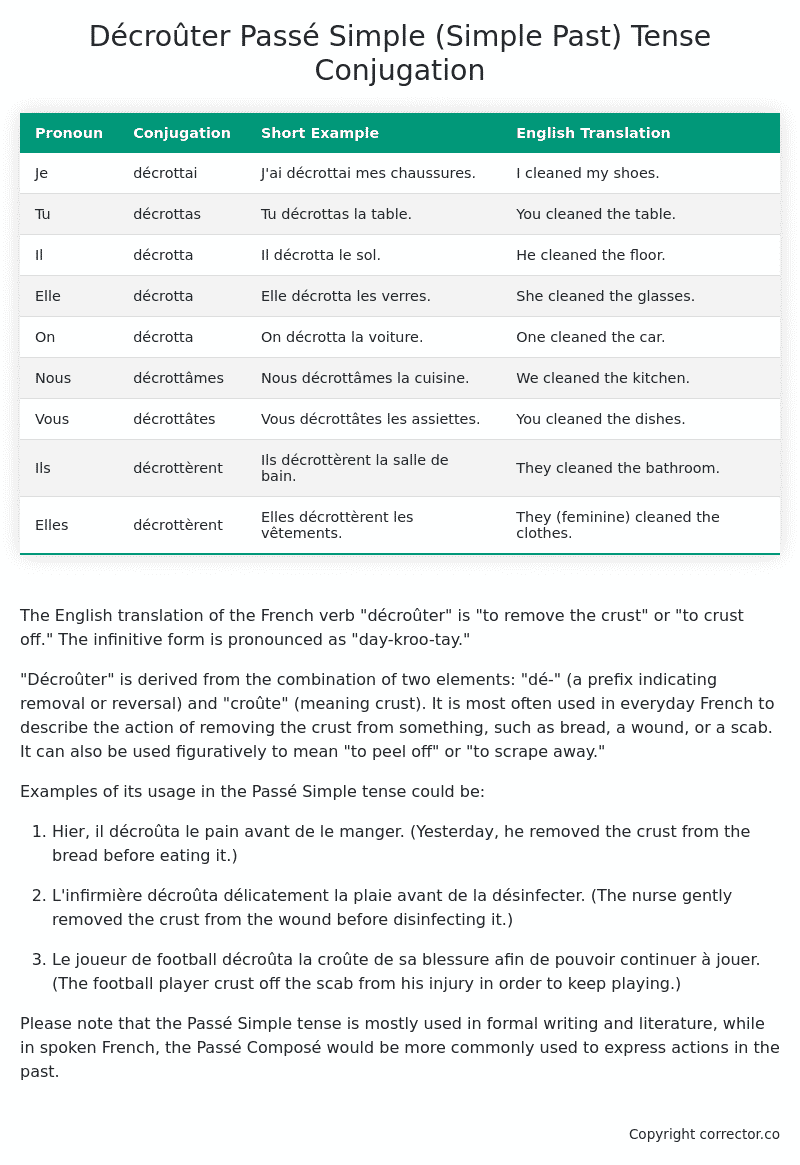Passé Simple (Simple Past) Tense Conjugation of the French Verb décroûter
Introduction to the verb décroûter
The English translation of the French verb “décroûter” is “to remove the crust” or “to crust off.” The infinitive form is pronounced as “day-kroo-tay.”
“Décroûter” is derived from the combination of two elements: “dé-” (a prefix indicating removal or reversal) and “croûte” (meaning crust). It is most often used in everyday French to describe the action of removing the crust from something, such as bread, a wound, or a scab. It can also be used figuratively to mean “to peel off” or “to scrape away.”
Examples of its usage in the Passé Simple tense could be:
-
Hier, il décroûta le pain avant de le manger.
(Yesterday, he removed the crust from the bread before eating it.) -
L’infirmière décroûta délicatement la plaie avant de la désinfecter.
(The nurse gently removed the crust from the wound before disinfecting it.) -
Le joueur de football décroûta la croûte de sa blessure afin de pouvoir continuer à jouer.
(The football player crust off the scab from his injury in order to keep playing.)
Please note that the Passé Simple tense is mostly used in formal writing and literature, while in spoken French, the Passé Composé would be more commonly used to express actions in the past.
Table of the Passé Simple (Simple Past) Tense Conjugation of décroûter
| Pronoun | Conjugation | Short Example | English Translation |
|---|---|---|---|
| Je | décrottai | J’ai décrottai mes chaussures. | I cleaned my shoes. |
| Tu | décrottas | Tu décrottas la table. | You cleaned the table. |
| Il | décrotta | Il décrotta le sol. | He cleaned the floor. |
| Elle | décrotta | Elle décrotta les verres. | She cleaned the glasses. |
| On | décrotta | On décrotta la voiture. | One cleaned the car. |
| Nous | décrottâmes | Nous décrottâmes la cuisine. | We cleaned the kitchen. |
| Vous | décrottâtes | Vous décrottâtes les assiettes. | You cleaned the dishes. |
| Ils | décrottèrent | Ils décrottèrent la salle de bain. | They cleaned the bathroom. |
| Elles | décrottèrent | Elles décrottèrent les vêtements. | They (feminine) cleaned the clothes. |
Other Conjugations for Décroûter.
Le Present (Present Tense) Conjugation of the French Verb décroûter
Imparfait (Imperfect) Tense Conjugation of the French Verb décroûter
Passé Simple (Simple Past) Tense Conjugation of the French Verb décroûter (You’re reading it right now!)
Passé Composé (Present Perfect) Tense Conjugation of the French Verb décroûter
Futur Simple (Simple Future) Tense Conjugation of the French Verb décroûter
Futur Proche (Near Future) Tense Conjugation of the French Verb décroûter
Plus-que-parfait (Pluperfect) Tense Conjugation of the French Verb décroûter
Passé Antérieur (Past Anterior) Tense Conjugation of the French Verb décroûter
Futur Antérieur (Future Anterior) Tense Conjugation of the French Verb décroûter
Subjonctif Présent (Subjunctive Present) Tense Conjugation of the French Verb décroûter
Subjonctif Passé (Subjunctive Past) Tense Conjugation of the French Verb décroûter
Subjonctif Imparfait (Subjunctive Imperfect) Tense Conjugation of the French Verb décroûter
Subjonctif Plus-que-parfait (Subjunctive Pluperfect) Tense Conjugation of the French Verb décroûter
Conditionnel Présent (Conditional Present) Tense Conjugation of the French Verb décroûter
Conditionnel Passé (Conditional Past) Tense Conjugation of the French Verb décroûter
Conditionnel Passé II (Conditional Past II) Tense Conjugation of the French Verb décroûter
L’impératif Présent (Imperative Present) Tense Conjugation of the French Verb décroûter
L’impératif Passé (Imperative Past) Tense Conjugation of the French Verb décroûter
L’infinitif Présent (Infinitive Present) Tense Conjugation of the French Verb décroûter
L’infinitif Passé (Infinitive Past) Tense Conjugation of the French Verb décroûter
Le Participe Présent (Present Participle) Tense Conjugation of the French Verb décroûter
Le Participe Passé (Past Participle) Tense Conjugation of the French Verb décroûter
Struggling with French verbs or the language in general? Why not use our free French Grammar Checker – no registration required!
Get a FREE Download Study Sheet of this Conjugation 🔥
Simply right click the image below, click “save image” and get your free reference for the décroûter Passé Simple tense conjugation!

Décroûter – About the French Passé Simple (Simple Past) Tense
Formation
Usage
Narration
Historical Context
Interactions with other tenses
Passé Composé
Imparfait
Conditional and Subjunctive
Summary
I hope you enjoyed this article on the verb décroûter. Still in a learning mood? Check out another TOTALLY random French verb conjugation!


